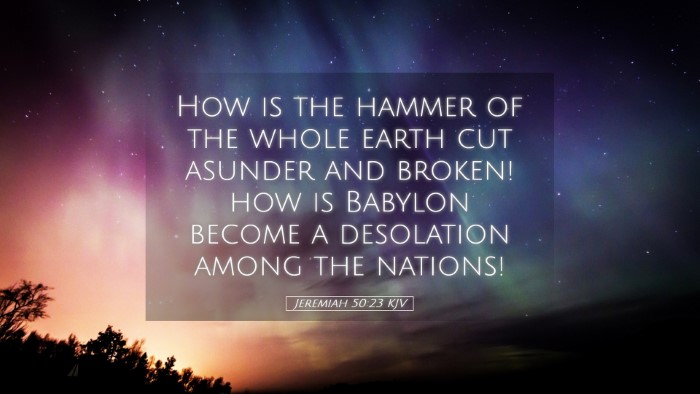Commentary on Jeremiah 50:23
Jeremiah 50:23 states: "How is the hammer of the whole earth cut asunder and broken! how is Babylon become a desolation among the nations!" This verse is rich with symbolism and prophetic significance. In order to appreciate its full meaning, we will explore insights from several public domain commentaries including those of Matthew Henry, Albert Barnes, and Adam Clarke.
Overview of the Context
Jeremiah prophesied during a tumultuous period leading up to and following the destruction of Jerusalem. Chapter 50 primarily deals with the prophecies concerning Babylon, symbolizing not just a geographical locale but also a representation of worldly power opposing God.
The Symbolism of 'Hammer'
Matthew Henry reflects on the metaphor of Babylon as "the hammer of the whole earth". In ancient times, hammers were tools of destruction and construction, often associated with power and the capacity to shape one's environment. Babylon, during its peak, was indeed a hammer—crushing its enemies and forging vast empires. Yet, as Henry notes, this tool of destruction could itself be broken, reflecting the divine judgment upon it.
Babylon's Fall
Albert Barnes emphasizes the dramatic fall of Babylon. The rhetorical question, "how is the hammer... broken?" serves to highlight the suddenness and severity of Babylon's demise. This fall is not merely physical but spiritual—a collapse of its ideologies, practices, and its very identity as a world power. Barnes remarks on the irony that a force so dominant would meet such an obvious and complete end, serving as a warning to all nations that pride and oppression will inevitably be judged by God.
Desolation Among the Nations
Adam Clarke expounds on the phrase "desolation among the nations". He interprets this to mean that Babylon, once a city of great splendor and influence, would become an object lesson for all generations. Clarke notes the historical reality that Babylon would eventually be deserted and left in ruins, serving as a stark reminder of the consequences of rebellion against God. This desolation signifies not just physical barrenness but also the absence of God's favor.
Theological Implications
This verse presents profound theological implications about power, divine sovereignty, and judgment. Each of the commentators agrees that God is portrayed as the ultimate authority over earthly kingdoms. The fall of Babylon indicates that no earthly power, irrespective of its might, can withstand the will of God.
Application for Believers
For pastors and theologians, the moral lessons encapsulated in Jeremiah 50:23 are vital. Henry posits that believers are called to witness the reality of God’s justice. Just as Babylon's fall was foretold and executed, so too can those who oppose divine truths expect to face similar fates. This serves as a reminder to maintain humility and righteousness in faith and conduct.
Warning Against Pride
- Henry's Insight: He points out the dangers of pride and arrogance, illustrating how these traits often lead to downfall.
- Barnes' Perspective: The lesson is clear: reliance on human strength is futile when pitted against divine judgment.
- Clarke's Counsel: He calls for vigilance and faithfulness, encouraging believers to avoid the pitfalls that led to Babylon's fate.
Encouragement for the Faithful
In the face of Babylon’s desolation, there is also a message of hope for the faithful. Just as God brought judgment upon Babylon, believers can be assured that He will uphold His covenant with His people. They are encouraged to remain steadfast in their faith, trusting in God's ultimate justice and plan for redemption.
Conclusion
Jeremiah 50:23 serves as a powerful reminder of the transience of earthly power and the enduring nature of God's sovereignty. Through the insights shared by Matthew Henry, Albert Barnes, and Adam Clarke, we derive understanding not only about historical events but also about timeless truths applicable in our lives today. As we reflect on this verse, let us hold fast to the assurance that God’s justice prevails, and His purposes are ultimately fulfilled.


